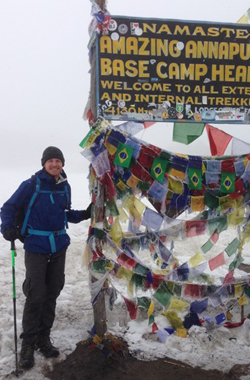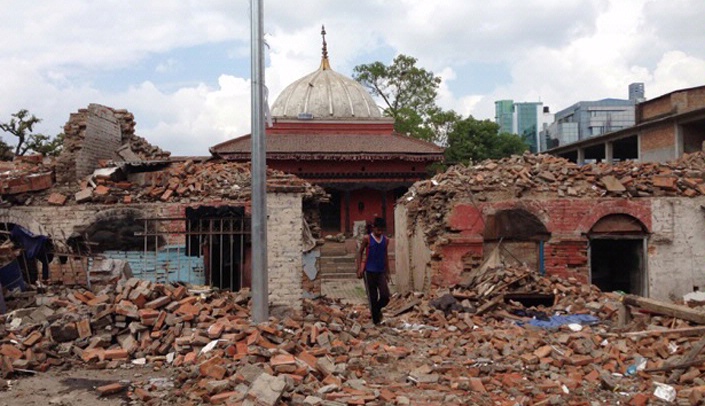Sam Thomsen, a fourth-year medical student, traveled to Nepal to help people before the massive earthquake that struck the country in late April.
 |
Thomsen was at Annapurna base camp when the quake hit. (Photos courtesy Sam Thomsen) |
He was touring the country on the day of the quake. He was 4,130 meters above sea level, at Annapurna base camp, when the quake hit.
“We still felt it there,” he said.
It took a while before the people at base camp, which has a landline but no reliable Internet access, could grasp the full magnitude of the disaster, Thomsen said.
“At first we weren’t sure of the extent, but as the day went on, we heard about the destruction at Kathmandu and the death toll,” he said.
On the way down Annapurna, and over a two-day hike back to where he could catch a bus to Kathmandu, Thomsen and his group passed several areas that had been impacted by landslides. Houses they had stayed in during the journey were left without roofs or walls. But that was only the beginning.
When Thomsen finally reached Kathmandu several days after the quake, his ride to his lodgings took him all the way across the devastated city.
“The western part of the city was hit the hardest,” he said. “There were so many people out in the destruction, trying to clean up. To see those massive buildings lying on their sides, it was pretty shocking.”
Being from Nebraska, Thomsen said, he’s not used to earthquakes — but he did see community outreach in the aftermath that Midwesterners might find familiar.
“People were everywhere, doing what they could to help the clean up,” he said. “Houses were destroyed, but people were trying to do their best to organize everything.”
Thomsen had traveled to Nepal to help people there. Now, he said, that opportunity exists for every member of the UNMC community, and in fact every citizen of the United States.
“It’s important, even though we may have different cultures and different beliefs, that when disaster hits, humanity will respond,” he said. “Nepal is not just a country, but it’s people just like us. A country like America is blessed with wealth and resources — this is our time to shine, an opportunity not only for UNMC but the entire country to step up.”

Well said Sam! Nepali men, women and children are suffering in the aftermath of this Earthquake. Hungry, Scared, Homeless and in Desperate NEED of food, medical care and water. We can each help – simply donate to the Himalayan Cataract Project (Select Nepali Relief Designation) and 100% of the money you donate will be sent to the Tilganga Institute of Ophthalmology, an on-ground Nepali run hospital, that will use the money to help care for the injured and provide relief food bags and water. This is the facility Sam worked at while in Nepal. It means Immediate intervention from an organization the Global Blindness Prevention Division at UNMC trust explicitly. I can testify that there isn't a more dedicated group of men and women in Nepal then those who work at Tilganga. I implore everyone to give what they can to ease the suffering these people are enduring for there isn't a more kind or gentle culture on this planet then those who are from Nepal. My heart breaks when I see the before and afters of this beautiful place and I only hope we can spare any additional lose of life for these people as they've already lost so many loved ones and rich history.
https://donate.cureblindness.org